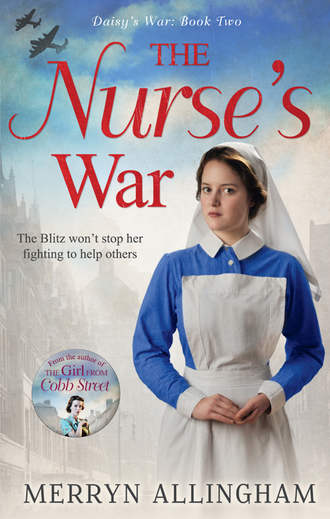
Полная версия
The Nurse's War
It was not until early afternoon that she climbed aboard one of the specially adapted Green Line buses travelling to Hill End. Last night’s raid had wreaked enormous destruction and casualties had been pouring into the hospital from the moment she’d walked on to the ward at seven that morning. As civil defence teams continued to dig people from the rubble, a trickle became a stream and, very quickly, a river. Medical staff had been working through the night and Daisy and her new shift were met by nurses and doctors near to collapse. The official handover was brief; time was short and they could barely hear each other above the jangle of ambulance bells and the sobs of hurt and shocked people. She was set to work immediately, bathing newly admitted casualties, a lengthy business since the wounded were covered from head to foot in brick dust and blood. The nurses worked tirelessly and at great speed, their aprons bloodstained, their young faces marked by fatigue. There was no time to eat. A snatched slice of bread and dripping and a large mug of tea were all Daisy managed before the ward sister called her over.
‘You should go, Driscoll. The escort party is waiting and we can spare you now. The ward is running well.’ Sister Elton gave the glimmer of a smile. It was the nearest she would ever get to giving praise.
Daisy made her way down the two flights of stairs to the street. Her head was aching and her legs hardly felt her own, but there was no possibility of rest. There was always more work to do. A nurse helping to load patients into one of the makeshift ambulances scrambled down to greet her.
‘Where did you get to last night?’ As she spoke, the girl tried unsuccessfully to tuck the straggling ends of her bright red hair into the starched cap.
‘I’m sorry I missed you, Connie, but I worked on. Sister needed extra help and by the time I got back, I was too tired even to speak and went straight to bed. I didn’t even make it to the basement.’
Connie Telford was her closest friend. Their rooms were next door to each other and in the last few months they’d often been rostered to work on the same ward. It was rare for them to miss an evening drink together, but Daisy had been too shocked last night to go in search of her friend and certainly in no mood to exchange confidences.
‘I can’t see us getting this lot settled before midnight.’ Her friend gestured to the line of buses waiting to leave. ‘Looks like we’ll be taking our cocoa at Hill End tonight.’
Daisy smiled a little wanly. If only cocoa was her sole concern. Today had been so hectic that even the reappearance of Gerald in her life had been pushed from her mind. But now he’d returned and was looming large. She would have to sleep at Hill End and would not be back in London until the following morning. There would be no opportunity to send the message he’d demanded. Perhaps if she didn’t respond, he would go away and leave her in peace. If only he would. She could see he was in a dreadful predicament, but there was no way she could help, and meeting him was pointless. All it would achieve would be to bring back the terror and grief of those last days in Jasirapur. It already had, she thought angrily. He demanded loyalty as his right, yet he’d explained nothing. How had he reached England, how had he travelled those thousands of miles alone and without money or support? His rescue by the villagers she could just about understand, but even that was extraordinary. The power of the water had been immense. Had she not faced it herself, standing on that riverbank, ready for the blow that would send her to her death? It was Grayson who’d arrived to rescue her, but too late to save her husband.
Yet somehow Gerald had survived. Survived to be a deserter. He hadn’t returned to his regiment in Jasirapur, hadn’t confessed his wrongdoing. Instead he’d gone into hiding. But he’d be discovered sooner or later, that was certain, so why did he not give himself up and face just punishment? Running and hiding could only be done for so long. And it was cowardly. She, and everyone she knew, was working tirelessly for their country, fighting for its very existence. Should she really be helping a man—husband or not—to abandon his homeland and make a bolt to safety?
CHAPTER 2
Today the journey to Hill End seemed longer than ever and, once they’d arrived, there were hours of work ahead of them. For the rest of the day while her hands bandaged, soothed, gave medicine and spooned food, Daisy’s mind was elsewhere, circling the same questions, but unable to find a solution. By ten o’clock that evening, the ward was calm and the night staff could be left to manage alone. The ward sister who had accompanied them from Barts shooed her nurses off to bed. At least there was no Mrs Phillips here to monitor the food they were eating or check that bedroom lights were out by ten-thirty. Daisy usually enjoyed the break from the inflexible set of rules at Barts. Nursing in London was a constant challenge and a source of adrenaline, which could buoy her on the most fatiguing of days. But at times its iron conventions made her yearn for a less rigid regime. No chattering, no sitting on beds, no eating—not even a single precious sweet from a patient. And one’s uniform had always to be immaculate: dress uncreased, pinafore starched and without a single lock escaping the small cap. It was no wonder that Connie fought a losing battle with her tumble of thick red hair and was constantly in trouble.
She came bustling up at that moment and grabbed Daisy’s hand, dragging her into the sitting room used by the permanent staff at Hill End. A few nurses were lolling in one or two of the shabby chairs dotted around the room, or flicking idly through a pile of dog-eared magazines while they carried on a desultory conversation. Her friend steered her into the quietest corner.
‘Now, Driscoll, what’s up?’ Hazy green eyes, wide with curiosity, fixed her to the spot.
‘Nothing, nothing at all.’ She did her best to look unconcerned.
‘That’s rubbish. Something is definitely wrong. I’ve been watching you since we got here and you’re not yourself. Now tell me what’s happened.’
Daisy reached up and unpinned her cap, shaking out the dark waves as though to free herself of constraint. She stabbed a hatpin through the starched white material. ‘I can’t,’ she said at length. ‘It’s too complicated.’
‘Don’t I know that? Everything to do with you is complicated. Whereas me, I’m an open book.’
Connie’s grin elicited a smile. Daisy could never feel downhearted when she was with her. The girl was chockfull of cheerful common sense and practical to her fingertips. She’d had to be, of course. As the eldest sibling in a crowded Dorset cottage, she’d borne the brunt of her mother’s frequent pregnancies and her father’s forbidding temper. Her sweet nature, though, had gone unvalued and, despite a large family, she appeared to be as lonely as Daisy. It was telling that she’d chosen not to train in Dorchester but to move miles away to the big city. It was probably that solitariness, Daisy mused, that had drawn them together in the first place. But by now they’d become the firmest of friends, confidantes in the daily struggle of nursing through a war.
‘It’s complicated because it doesn’t just concern me.’
‘So who else? Who else do you know?’
Her friend wasn’t giving up, it seemed, and she longed to confide in her. It would be good to share the burden, but it would also be grossly unfair. Gerald had committed a crime and she must be careful not implicate Connie by confessing the trouble she was in.
She felt her hand squeezed and her friend’s voice, low and encouraging. ‘You know that whatever you tell me, I can keep my mouth shut. Who is worrying you so badly?’
Perhaps if she said only a little? She’d already told Connie more than she’d ever thought possible, and months ago had abandoned her ingrained reserve to confide that she’d once been married. Connie was the only one she’d ever told about Gerald.
She took a deep breath and met her friend’s eyes. ‘It’s my husband.’
The girl’s mouth fell open and it was a while before she could speak. ‘But he’s dead.’
‘That’s the problem. It turns out that he isn’t. And he’s managed to trace me—it doesn’t matter how—but he followed me back to the Home last night. I think I’m still in shock.’
‘But how can it be him?’ Connie was floundering. ‘You saw him drown.’ The phrase was blunt and to the point. And it was true, she had seen him drown, or so she’d always thought.
‘He didn’t. His clothes were caught up on one of the floats. You remember, I told you we were at a festival called Teej and there were all these stupendous floats with huge gods and goddesses that were launched into the river. I guess most of them were smashed to pieces when the monsoon broke—the river turned into this raging torrent—but there was enough left of one apparently for Gerald to catch hold of and survive. He was rescued further downstream.’
‘And then?’ Her companion edged forward.
‘I have no idea. How he got to England is a mystery.’
Connie gave a soft whoop. ‘That’s quite a story. Romantic too. Your husband has travelled thousands of miles to claim his wife. You told me things were bad between you before he died, but maybe this is a turning point.’
‘Unlikely. He’s come back because he has nowhere else to go. And he’s come to me only because he needs help. But there’s no way I can help him, and he won’t believe me.’
Her friend wrinkled her forehead, the freckles almost joining each other in puzzlement. ‘What kind of help does he want?’
She took some time to answer, weighing up how much she should say, how much she dare tell even a close friend. It would not make a good hearing and it might make a dangerous one. But Connie was right when she said she could keep her mouth shut. It was a quality that was necessary, Daisy guessed, living amid a large, raucous family.
‘I’ve never said anything before,’ she said slowly, ‘but Gerald was involved in some wicked things in India. He died trying to rescue me from a dangerous gang.’ She saw Connie’s bewildered expression. ‘I told you it was complicated.’
‘A dangerous gang? What on earth did you get yourself involved in?’
‘I made a discovery that I shouldn’t have. Something that could have hung every member of the gang. And they knew I knew, so I had to die.’
‘My God, Daisy!’
‘Gerald found the place they were holding me. He put up a fight and that messed up their plans. It gave the police sufficient time to get to me.’
‘It might not be exactly romantic but—’
‘He wasn’t innocent,’ Daisy said quickly. ‘His association with the gang was what put me in danger.’ She wasn’t going to mention the ‘accidents’ that Gerald had been happy to agree to, accidents that had been meant to frighten her away but hadn’t.
‘In the end he did the decent thing, I know.’ She tried to sound grateful. ‘And he paid a price for it. Not death as it’s turned out, but as good as, I guess.’
Connie’s mind was still in the past. ‘What happened to the gang?’
‘They went to prison and they’re still there. They must believe they drowned Gerald. But his regiment thought he’d died trying to rescue me. The army had no idea of the real situation and they still don’t. He never went back to Jasirapur once he’d recovered from his injuries. If he had, the Indian Army would almost certainly have court-martialled him and then turned him over to the civilian courts. Anish warned me he could face criminal charges, as well as disgrace.’
‘I’m sorry for all these questions, but who is Anish?’
‘It doesn’t matter.’ She couldn’t bring herself to talk about the man who had masterminded her downfall, yet for whom she was still grieving. ‘The point is that Gerald is a deserter who wants my help, and I don’t know what to do.’
Connie shook her head. ‘You can’t turn him in, that’s for sure. Whatever he’s done, he’s still your husband. Could you persuade him to give himself up?’
‘I doubt it. Gerald is someone who first and foremost looks after his own interests. In this case it’s keeping out of prison. He wants to leave England and travel to a neutral country where he’ll be safe.’
‘And you’re going to help him?’ Her friend had the ghost of a smile on her lips.
‘Exactly. It’s stupid. There’s no way I can. I’ve no money and I know nobody who could get the papers he needs.’
Connie was thoughtful. ‘But if you could get those papers, it would mean you’d lose him from your life once and for all. I know you think you’ve put the whole Indian thing behind you, Daisy, but it’s clear that you haven’t. Until tonight I didn’t know how awful it had been for you, though I knew something pretty bad had happened. You never talk about the past. Whenever I’ve touched on India or your husband, you’ve brushed it off as though your time there wasn’t worth mentioning. It’s obvious, though, that it still looms large.’
It did and she couldn’t deny it. The frightening months she’d spent in Jasirapur when she’d suffered one so-called accident after another, only to discover that it was her husband behind them. And then to find that her dear friend, Anish, was the ultimate puppet master. The grief at losing him; the guilt at not grieving for Gerald. It had all been too much and she had shut her mind fast. The past could be locked up in a box and the key thrown away. That’s how she’d thought about her time in India. That’s why she’d been unable to be anything but a poor friend to Grayson. He was too involved in the whole business; he was a constant reminder of what she had to forget.
‘What about Grayson Harte?’ her companion asked out of the blue. It was almost as though Connie had read her mind. ‘Isn’t he in the Secret Intelligence Service? Surely he could manufacture false papers. That’s what they do, isn’t it?’
‘No.’ Her response was unequivocal.
‘What do you mean “no”—I think it’s a brilliant idea.’
‘I don’t see Grayson any more. You know that.’
‘But you could. You know where he works. What’s to stop you visiting him?’
‘So I just turn up at his Baker Street office and say, Sorry, Grayson, that I wasn’t able to return your feelings. But actually you can do me a favour. Gerald didn’t die after all, can you believe that? He’s back in England and living in London. He’s a deserter, of course, and I need your help to get him out of the country.’
‘Okay, I understand. I know it won’t be easy.’
‘Not easy! It’s impossible. And I refuse even to think about it.’ She uncurled herself from the lumpy chair and walked to the door, unable to stifle the first of many yawns. ‘I’m so tired, Connie, I don’t think I can even find my way to bed.’
‘You will,’ her friend promised, ‘and you’ll sleep. And tomorrow you could feel quite differently.’
But she didn’t feel differently; when back in London the next evening she walked quietly through the darkened streets. This time she was careful to leave the hospital with other nurses who had come off duty at the same time. After the encounter with Gerald, she was taking no chances, but the only footsteps she heard were those of her companions and they reached Charterhouse Square without incident. At the huge oak door, she waited patiently while the girl in the lead fished around in her bag for a key. Tonight the darkness seemed more impenetrable than ever, not even a glimpse of moon or stars. Several seconds of fumbling produced the key and Daisy mounted the steps behind her companions. As she turned to walk through the door, she glimpsed a shadow pass between the square’s trees. Or so she thought. She couldn’t be entirely sure, but her eyes had slowly grown accustomed to the intense gloom and what she’d seen was definitely a form that was blacker than the rest. And it was a form that was moving. Could it be the figure of a man and that figure, Gerald? She’d had no time to send the note he’d insisted on, so had he come to check on her, to harangue her on where her duty lay? It was more than likely.
She walked into the tiled entrance hall and stood still, aware of her pulse having gone into overdrive. She was becoming stupidly panicked and she must stop herself from seeing things that were probably not there. Given the heightened state in which she’d been living these last two days, it was unsurprising her mind was all over the place. It wasn’t fear of bombing raids that disturbed her—that was a fear everyone shared. It wasn’t even the unremitting labour. There were nurses who worked harder. It was alarm at finding her husband alive, and not just alive, but close by and demanding her aid.
She passed the staff pigeonholes with hardly a glance. There were never letters for her. Tonight, though, something white glared balefully from the scratched wooden box. An envelope addressed to her. She recognised the writing straight away. So it had been Gerald lurking in the trees, watching for her, waiting to accost her. But why hadn’t he done so? Instead, he’d pushed the missive through the letter box and someone had picked it up and put it in her pigeonhole. She took the envelope and held it up to the dim light which dangled from the ceiling. Now that she looked closely, she saw the letter had not been hand delivered at all but had come through the mail. It was postmarked ten a.m. It had come in the morning post and been waiting for her all day. So the shadow she’d seen … it couldn’t have been Gerald. But if it wasn’t, who was it?
Her heart again began to beat far too rapidly, sounding heavy in her ears. She tried to calm herself by visualising what she’d seen. It must have been imagination. But the more she thought of it, the more certain she became that there had been a figure there. It wasn’t just panic talking. She recalled the blurred image and fixed her mind doggedly on it. It reminded her of another shadow she’d glimpsed recently, one that had passed like a ripple through those self-same trees the night before last, when Gerald had stopped her on the front steps. Had someone been watching them then? Was someone watching her now? Or was that someone looking for Gerald, looking perhaps to find and hand over a deserter? She shook her head. It was better to think it merely the wind in the trees.
Gerald’s note was brief and to the point. She hadn’t named a meeting place, he accused, so he would: Hyde Park, the eastern edge of the Serpentine. Tomorrow at two o’clock. Didn’t he realise that she was a working woman, a nurse who had barely a day to herself every month? She felt exasperation riding tandem with misgiving. Meeting him was the last thing she wanted, but she would have to go or she’d have him knocking on the door. Whether or not she could take her free time would depend on what was happening on the ward. She would have to petition Sister Elton first thing in the morning and hope for permission. She calculated that she could just about make it to the park and be back on the ward within two hours, which was the most she could count on. But what she was to say to Gerald, she had no idea.
She still had no idea the following afternoon when she walked into Hyde Park. Speakers’ Corner was unusually crowded for a weekday, despite the lack of any orator and soapbox. A rare burst of spring sunshine must have tempted the mill of people. Daisy wound her way through the crowd as quickly as she could, negotiating a host of children and their nannies and a small group of women on their lunch break, enjoying a cigarette. The military post on her left was quiet and soldiers stood chatting to members of the Home Guard. A heavy anti-aircraft battery had been set up nearby along with a number of rocket projectors. She’d been told they fired six foot shells packed with metal debris—broken bike chains, old razor blades—just about anything that could be loosed skywards and disrupt the flight of bombers swooping up river from the docks to the West End.
Today, though, there was so little activity you could almost forget the guns’ incongruous presence in this beautiful, green space. The false sense of tranquillity was increased by dozens of barrage balloons which floated serenely five thousand feet above her head. They were supposed to force enemy aircraft to a height where aiming their bombs would be difficult, but the ‘blimps’, as they’d been nicknamed, had so far proved ineffective. Their silvery presence, though, added a dreamlike quality to the scene.
She reached the path leading to the Serpentine and felt inside her cape for the watch pinned to her bib. She wasn’t at all sure that she would make Gerald’s deadline, though so far luck had favoured her. She hadn’t had to ask for time off. Sister Elton had noticed how pale her nurse was looking and insisted, during the rushed morning tea break, that Daisy take several hours away from the ward once lunch had been served and the medicine trolley had done its rounds. Then, as she’d left the hospital, one of the few doctors who ran a car had offered her a lift as far as Oxford Street. Connie was on a short break, too, and off to sit in the cathedral gardens at St Paul’s. She saw Daisy getting into the car and pulled her mouth down as if to say, I told you so. It was her friend’s running joke that Dr Lawson had a particular fondness for Daisy.
If he had, she certainly wasn’t going to play on it. Work filled her entire life and that was fine. She was simply grateful for the lift. Even so, she was having to walk fast, winding her way on and off the path and around the trenches that had changed the face of all the London parks. By the time she reached the lake, she was breathless. Once more she flicked her watch face upwards. A minute to two. She’d made it, but not before Gerald. He was marching up and down beside the still water, his shoulders hunched and a frown darkening his face.
‘I thought you weren’t coming,’ was his greeting. ‘You didn’t contact me—you said you would.’
‘I couldn’t.’ She forced herself to remain calm despite his blustering. ‘I’ve been out of London for several days and it was last night before I collected your note.’
‘Now you are here, we shouldn’t waste time.’
She was taken aback by his abrasiveness, but why should she be? It was something she had grown used to in the few months they’d spent together. Now, though, she wasn’t the same girl who had travelled to India to marry him, a naïve innocent who’d foolishly believed herself loved. Her emotions had been put through fire, and she’d emerged with a new, tempered edge. If they were going to talk, she wanted some answers.
‘Shall we sit down?’
She gestured to one of the deckchairs lined up around the lake. In the first few months of the war, the chairs had been whisked from sight, but popular protest had succeeded in getting them reinstated. He didn’t immediately sit, but instead scanned the park for some minutes, turning his head in a complete circle. Then, seemingly reassured, he slumped heavily into the nearest seat and swivelled to face her.
‘Well? What’s the plan?’
‘I have some questions.’
He screwed up his face in an expression of deep frustration. ‘While you’re asking questions, I’m falling into ever greater danger. You don’t seem to appreciate that.’
‘If I’m to help, I need to know what’s happened since the last time I saw you.’
That was mendacious. No matter how much he told her, she was unlikely to be able to help. But she deserved to know how this ghost husband had come back to her from the dead, and she was willing to wait while he found the words. He was staring straight ahead, his face fixed and giving no sign that he was willing to talk. From the corner of her eye, she noticed a small boy arrive on the other side of the lake. He was cradling a boat in his arms and bouncing excitedly up and down beside his mother. He was about to sail a new toy, she thought, and that was a big event in this time of austerity.
‘I’ve already told you all you need to know,’ Gerald said at last, his tone grudging. ‘I was saved from drowning, broke an arm and a few ribs, was patched up by a local wise woman and sent on my way.’
‘And the villagers never asked where you’d come from?’






